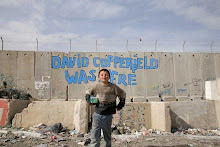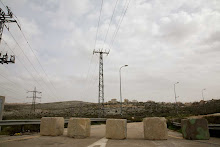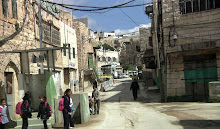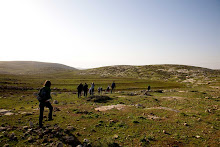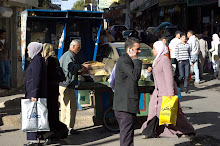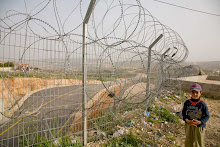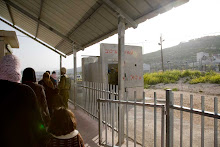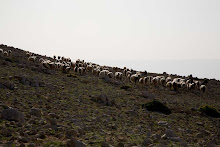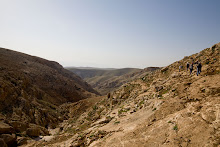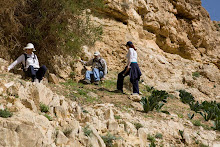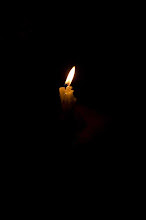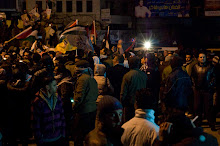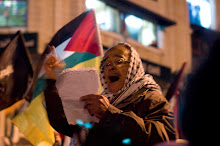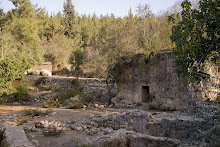I have heard this question perhaps several dozen times since I have landed in Ramallah. The query comes from Israelis when they learn I live here. I have never been a 'hero' as I have mentioned many times when asked about making my film here during the second intifada. But the questions persists despite the recent bombing of Gaza or the crazy control of cities and borders in Palestine by the Israeli army.
Image 1: The Real
Am I afraid? Of what, I wonder? What are they asking me? Israel has this place locked down and on its knees. They control land, sea, air, water and Palestinian lives. I know that the question is about the Palestinian who wants to ‘erase me’, ‘kill me’, ‘throw me into the sea’, well, you get the picture. But no, I am not afraid—there is myth and reality and I am here in a place in which real people live real lives: Our Arabic teacher, she is 19, has concerns about finishing university, her brother's impending marriage, and the fact that her teachers say she talks too much...I don't know, 19 year old concerns; And then there is our landlady, Huda (70), who is worried about whether we ate enough that day (after she fed us four times) or how her daughters in the US are faring, or her excitement about me teaching her how to use the internet; Am I afraid? Of what?
It reminds me of James Baldwin's essay: Stranger in the Village in which he describes his experience as a Black man in a Swiss village. He illustrates this remote village's ignorance of the "Black Man," something they had never encountered. He compares it to America's relationship at the time to Blacks and the racism therein—despite the two peoples living in the same place, Whites had not really ‘encountered’ Blacks in any way other than the stranger among them. I cannot help but feel this way when Israelis ask me, in what I now imagine to be a southern-belle accent: "but now aren't you afraid of them folk"?
Racism as the outcome of colonial enterprise has been written about time again—more than I could ever do it justice here. But I can only surmise from my experience, and the nagging question about fear, that it is at play here in the most frightening of dimensions.
The Israeli building of the wall has achieved its purpose: Not to protect or defend Israel from 'terrorists', but to separate and entrench ignorance, fear and hatred.
Image 2: Fear
Just the other day I received an email from a friend who had decided to boycott the gay and lesbian film festival in Tel Aviv. He copied me on the response from the organizer, a gay man who we would assume is a learned, educated 'other' in Israeli society—one who might have insight into the complexity of the situation resulting from his own experience of intolerance and hatred. But alas, racism and its incumbent fear played its hand here too. Here was his response to my friend’s attempt to explain why he couldn’t screen at the festival in Israel at this moment:
I'm sorry for you and thanks to other important film-makers
that want to meet us, seat (sic) with us and talk with us.
Hope that one day you could (sic) screen your movies in Ramallah but
today we learn that Hamas are (sic) going to get prime-minister (sic) in
all Palestine. The Fatah prime minister resign (sic). so very soon
they will control not only Gaza but all Palestine and Iran's lows (sic)
are going to be in Ramallah too. So your dream is very far.
His lack of any understanding of the political reality here, and his panic therefore of “Palestine as Iran” resulting from a Hamas-led government—which is not the case anyhow, (and which of course in his mind equals the eradication of all homosexuals), invokes the question I am asked over and over again: “Aren't you afraid?” These ‘masked bogeymen’ haunt his imagination and become his real world vision of the neighbour behind the wall—the uncivilized savage.
Image 3: Fear, Still
A few weeks ago Tamira and I joined a hiking group here in Palestine. We go out on Fridays and 'discover' places we would not see otherwise. We have not found our fellow hikers to be scary although sometimes the paths we hike can be a little precarious. While in Tel Aviv we found ourselves staring through a plate glass window at hiking boots. While not intending to buy anything, we thought we could try some on just for the heck of it. Trying on a series of boots necessitates a series of questions: "Where will you be hiking?" "What kind of terrain?" "How long will you be walking for?" "Have you hiked here in Israel before? Where are you staying?" Tired of evading such queries I was pretty blunt: "I'll be hiking in the West Bank, in Palestine. We're living in Ramallah. We've joined a hiking group there." My fitter looked up from my boot-ensconced feet and was a bit confused: "Why are you there? What do you do?" I explain and he explains. My tree hugging gentle giant simply ‘wishes that things weren't the way they are but they must be like this because of the terror’. He tells me he is a peacenik but that after seeing THAT video (from 2000 during the second Intifada) of Palestinians beating and killing two Israelis (soldiers) and tossing them out of a window, he simply cannot imagine any other way. I reminded him that while indeed this was a terrible incident, it cannot be used as one to define a whole nation; I explain that it was played over and over again on Israeli (and world) television exactly to get this message of fear and terror embedded in the Israeli conscience; and that it happened just after 100 Palestinians had just been killed, 24 of whom were children! I cannot justify it, nor would I, but context is everything. His eyes were glazed-over, it made no difference, my arguments fell on deaf ears—He had been traumatized. "Aren't you afraid?" he asked. No, I said, but there was no point—the bogeymen were etched in his mind.
Image 4: Back to Reality
Do I think this is a great place for queer existence currently? No, not at all. Do I think it is an open, liberal, democratic society in which all can exercise freedom? No, not that either. There is much progress to be made. But nor do I think that 'tolerance' or 'justice' exist most places, and certainly not in Israel where military law supersedes civil law on a regular basis and the state defies international law time and again with impunity.
So what do I deduce from "Aren't you afraid?" That racism is alive and well in Israel; that the 'other' is indeed the scary monster under the bed (or behind the wall); that the cycle of violence will perpetuate as a result of this ignorance.
No, I am not afraid of what I am told I should be, but I am afraid of the spiraling ignorance, hatred and fear. I am afraid when 26% of the country votes for a fascist party and leader in hopes that he may ‘clean-things up'. I am afraid when the Palestinian becomes seen as the feared 'sub-human savage’ behind the wall. There is much to be afraid of in that.
Thursday, March 19, 2009
Wednesday, December 31, 2008
A New Old Year in Palestine
It is 1:30am in Ramallah, Palestine. Our New Year's eve consisted of a a few nice nibbles at a friend's house, watching BBC and Al Jazeera for the latest updates on Gaza and then a midnight vigil for the victims of Israel's bloodiest attack and murder in Gaza since 1967. Happy New Year.
As the news will tell you, Israel commenced an aerial attack on Gaza Saturday morning and continues until now, New Year's eve. The death toll is two shy of 400 (although that was an hour ago, who knows how many more as the attacks continue into the night) and the injured hover at 2000. The main hospital in Gaza is not only overflowing and unable to take care of all the wounded but has entered a crisis with no medicine to care for them. They had been short on supplies since Israel tightened the noose around Gaza and cut off electricity, humanitarian aid, food, fuel, etc in November. So you can imagine where the situation is at this point. Can we even begin to imagine?
Olmert said today: "there is no need for a 'humanitarian ceasefire' as there is no humanitarian crisis". How many lies can fall from this man's lips and that of the rest of the government?! I have been reading Israeli denial, evasion, justification and the like for the past four days-it is enough to make anyone sick. The racism is so extreme that Palestinians are not human to Israelis anymore. Just today I heard a Birthright leader say when asked how many Gazans had been killed: "I don't care about Arab lives". This is a man who is taking kids on their first tour of Israel and it is pretty clear that indeed his sentiments are not his alone. Palestinians are not human beings to many Israelis, they don't see them (nor do the planes dropping bombs, they don't see 'people' they see 'targets'). Much of the Israeli papers are full of words like: "300 terrorists were preparing to graduate from an academy in Gaza today, terrorists who were planning on killing Jews" (1) These were in fact newly trained policemen, graduating from their academy when Israel dropped the bomb on them. Same for a family that was loading a truck with gas cannisters and scrap metal: according to the IDF (2), "eight members of a Hamas cell were killed in this aerial attack, we considered them a legitimate target" (3) According to Israeli Human Rights Group, B'tselem, who had an investigator in the area (not several thousand meters in the sky like the fighter jets), there were remains of gas cannisters only, not 'rockets' and the man who owned the van said he lost his son and seven family members while delivering gas and collecting scrap metal from the bombed-out buildings. I am sure there are hundreds more stories like these, but almost none are published. The dead become 'terrorists', 'Hamas' or 'collateral damage' effctively erasing any of their faces, names and lives altogether.
Ha'aretz, once thought of as Israel's 'left, intellectual paper' consistently has the number of wounded Israelis on their cover daily: "two dead and four wounded"—if you didn't know already. I'm not saying their deaths don't count but is it not unbelievable that over 400 people have been massacred and 2000 more injured and they don't show up on the front page?! I have also checked out the Globe and Mail, the New York Times and even the Guardian and their insistence on 'balanced reporting' is not in fact balanced but actually about making sure they don't piss off the Israelis, thus covering as much of the Israeli 'story' as the Palestinian...did anyone else notice this IS NOT A BALANCED SITUATION?!
Just a few facts that most of the papers are neglecting to mention in their scramble to be 'balanced': 1. Israel attacked Gaza and its citizens. Bombing the most densely populated place on earth does not leave much room for 'not aiming at civilian targets'...the whole place is mixed with civilians. And people are not 'collateral damage' as Tzipi Livni mentioned in a move to make people understand that 'this is what happens in war as undesirable as it is'; 2. Israel claims (as does most of the press in parrot-like fashion), that the reason they attacked was to stop the rocket fire from Gaza (which have not killed until this week). Let's be very clear: the rockets were in response to the Siege on Gaza which began in November after an Israeli attack inside the strip undermining the truce established in June. Although both sides violated the truce before, this was on a much larger scale(4); 3. The siege has effectively caused the collapse of infrastructure and has resulted in a humanitarian crisis. 4. While Israel insists there is no 'humanitarian crisis', the UN, the World Bank, Oxfam the Red Cross and Red Crescent, have been declaring otherwise for months.
Between the starving of a people, the cutting off of all supplies, medical and otherwise, the consistent breaking of the truce, I would argue that balance should not be what a journalist strives for in reporting but rather context and fact to better explain the current situation.
There are protests going on across Israel that of course most will never hear about as the police have taken to brutally breaking them up and thus presenting a homogeneous image to the world. Israeli demonstrations have effectively been dismissed in the papers as "Violent Arab Demonstrations" while Abbas' Fatah Army is 'controlling' demonstrations here in Ramallah (they say they are protecting Palestinians from being killed by Israelis) But in the meantime, showing one's outrage for the killing of hundreds of people has been completely clamped-down on for fear of undermining what Abbas/Fatah and the Israel effectively want: Election Wins all around.
And so we sacrifice women, children and families so that Israeli leaders can deliver their election speeches and Abbas can take back Gaza despite losing DEMOCRATIC elections over a year ago. It was only a matter of time and here we are. The only democracy in the Middle East? I guess it depends how you understand that word. Happy 2009.
(1)Hamodia daily paper January 1st, 2009
(2)Israel Defense Forces
(3)Brigadier General Miri Regev, IDF spokesperson
(4)On November 5th, the Israeli government sealed all the ways into and out of Gaza. Food, medicine, fuel, parts for water and sanitation systems, fertilizer, plastic sheeting, phones, paper, glue, shoes and even teacups are no longer getting through in sufficient quantities or at all.
As the news will tell you, Israel commenced an aerial attack on Gaza Saturday morning and continues until now, New Year's eve. The death toll is two shy of 400 (although that was an hour ago, who knows how many more as the attacks continue into the night) and the injured hover at 2000. The main hospital in Gaza is not only overflowing and unable to take care of all the wounded but has entered a crisis with no medicine to care for them. They had been short on supplies since Israel tightened the noose around Gaza and cut off electricity, humanitarian aid, food, fuel, etc in November. So you can imagine where the situation is at this point. Can we even begin to imagine?
Olmert said today: "there is no need for a 'humanitarian ceasefire' as there is no humanitarian crisis". How many lies can fall from this man's lips and that of the rest of the government?! I have been reading Israeli denial, evasion, justification and the like for the past four days-it is enough to make anyone sick. The racism is so extreme that Palestinians are not human to Israelis anymore. Just today I heard a Birthright leader say when asked how many Gazans had been killed: "I don't care about Arab lives". This is a man who is taking kids on their first tour of Israel and it is pretty clear that indeed his sentiments are not his alone. Palestinians are not human beings to many Israelis, they don't see them (nor do the planes dropping bombs, they don't see 'people' they see 'targets'). Much of the Israeli papers are full of words like: "300 terrorists were preparing to graduate from an academy in Gaza today, terrorists who were planning on killing Jews" (1) These were in fact newly trained policemen, graduating from their academy when Israel dropped the bomb on them. Same for a family that was loading a truck with gas cannisters and scrap metal: according to the IDF (2), "eight members of a Hamas cell were killed in this aerial attack, we considered them a legitimate target" (3) According to Israeli Human Rights Group, B'tselem, who had an investigator in the area (not several thousand meters in the sky like the fighter jets), there were remains of gas cannisters only, not 'rockets' and the man who owned the van said he lost his son and seven family members while delivering gas and collecting scrap metal from the bombed-out buildings. I am sure there are hundreds more stories like these, but almost none are published. The dead become 'terrorists', 'Hamas' or 'collateral damage' effctively erasing any of their faces, names and lives altogether.
Ha'aretz, once thought of as Israel's 'left, intellectual paper' consistently has the number of wounded Israelis on their cover daily: "two dead and four wounded"—if you didn't know already. I'm not saying their deaths don't count but is it not unbelievable that over 400 people have been massacred and 2000 more injured and they don't show up on the front page?! I have also checked out the Globe and Mail, the New York Times and even the Guardian and their insistence on 'balanced reporting' is not in fact balanced but actually about making sure they don't piss off the Israelis, thus covering as much of the Israeli 'story' as the Palestinian...did anyone else notice this IS NOT A BALANCED SITUATION?!
Just a few facts that most of the papers are neglecting to mention in their scramble to be 'balanced': 1. Israel attacked Gaza and its citizens. Bombing the most densely populated place on earth does not leave much room for 'not aiming at civilian targets'...the whole place is mixed with civilians. And people are not 'collateral damage' as Tzipi Livni mentioned in a move to make people understand that 'this is what happens in war as undesirable as it is'; 2. Israel claims (as does most of the press in parrot-like fashion), that the reason they attacked was to stop the rocket fire from Gaza (which have not killed until this week). Let's be very clear: the rockets were in response to the Siege on Gaza which began in November after an Israeli attack inside the strip undermining the truce established in June. Although both sides violated the truce before, this was on a much larger scale(4); 3. The siege has effectively caused the collapse of infrastructure and has resulted in a humanitarian crisis. 4. While Israel insists there is no 'humanitarian crisis', the UN, the World Bank, Oxfam the Red Cross and Red Crescent, have been declaring otherwise for months.
Between the starving of a people, the cutting off of all supplies, medical and otherwise, the consistent breaking of the truce, I would argue that balance should not be what a journalist strives for in reporting but rather context and fact to better explain the current situation.
There are protests going on across Israel that of course most will never hear about as the police have taken to brutally breaking them up and thus presenting a homogeneous image to the world. Israeli demonstrations have effectively been dismissed in the papers as "Violent Arab Demonstrations" while Abbas' Fatah Army is 'controlling' demonstrations here in Ramallah (they say they are protecting Palestinians from being killed by Israelis) But in the meantime, showing one's outrage for the killing of hundreds of people has been completely clamped-down on for fear of undermining what Abbas/Fatah and the Israel effectively want: Election Wins all around.
And so we sacrifice women, children and families so that Israeli leaders can deliver their election speeches and Abbas can take back Gaza despite losing DEMOCRATIC elections over a year ago. It was only a matter of time and here we are. The only democracy in the Middle East? I guess it depends how you understand that word. Happy 2009.
(1)Hamodia daily paper January 1st, 2009
(2)Israel Defense Forces
(3)Brigadier General Miri Regev, IDF spokesperson
(4)On November 5th, the Israeli government sealed all the ways into and out of Gaza. Food, medicine, fuel, parts for water and sanitation systems, fertilizer, plastic sheeting, phones, paper, glue, shoes and even teacups are no longer getting through in sufficient quantities or at all.
Friday, December 19, 2008
Glory, Glory
So Xmas is upon us in the (un) holy land. Tamira and I will go to Bethlehem to see what its all about. Bethlehem is 15 kms from Ramallah, that's about 15 minutes by car under normal circumstances...but as we know, it is anything but that: We are counting on about two hours (with holiday traffic at the checkpoints of course—ok, maybe three). We've been studying our route and hopefully by xmas eve we'll know what we are doing. We thought donkeys might be most appropriate in speed and symbol.
I promised I wasn't going to glorify Palestine or its people in the opening of my blog and so far I have kept true to my word. But I have to say, people here are making this very difficult for me! There isn't a day that goes by where Tamira and I don't walk out of a shop, a meeting, an interaction and not shake our heads saying 'it can't be so, people just cannot be THIS nice!' The other day we went to buy a printer. The shop's VISA machine wasn't working and we didn't have cash. They said: "Just take it home and come by and pay us tomorrow, don't worry." Hello? Did you hear that?! 'Please take our merchandise oh person we have never met before and come pay us some other time'. I think that might have happened to my grandmother in 1910. This happens to us daily. So there it is, a broken promise, glory, glory. Crazy.
Other than that we have been working on a small film about Mahmoud Darwish, the late great poet laureate of Palestine. Darwish is most often described as 'the people's poet' and yet his poetry of the last many years is so very dense, so very difficult. I think it doesn't actually really speak to 'the people' any longer but his legacy does. I would argue too that as soon as you are appointed 'the people's' anything, you really can no longer belong to the people as you have become but a symbol and symbols are the exact opposite of the people—they are singular and external—no doubt one of the reasons Darwish resisted this title for so long. But it is through his words, his work, his poems and given time to actually sift through that I believe is the way back to the so-called people. It is in trying to find the rhythm of Darwish that we hope to work through the rhythm of the life lived here. I am attempting to follow the directive of my friend Fady: to shed my skin and still be in it so I may get closer to understanding.
Glory, Glory be.
I promised I wasn't going to glorify Palestine or its people in the opening of my blog and so far I have kept true to my word. But I have to say, people here are making this very difficult for me! There isn't a day that goes by where Tamira and I don't walk out of a shop, a meeting, an interaction and not shake our heads saying 'it can't be so, people just cannot be THIS nice!' The other day we went to buy a printer. The shop's VISA machine wasn't working and we didn't have cash. They said: "Just take it home and come by and pay us tomorrow, don't worry." Hello? Did you hear that?! 'Please take our merchandise oh person we have never met before and come pay us some other time'. I think that might have happened to my grandmother in 1910. This happens to us daily. So there it is, a broken promise, glory, glory. Crazy.
Other than that we have been working on a small film about Mahmoud Darwish, the late great poet laureate of Palestine. Darwish is most often described as 'the people's poet' and yet his poetry of the last many years is so very dense, so very difficult. I think it doesn't actually really speak to 'the people' any longer but his legacy does. I would argue too that as soon as you are appointed 'the people's' anything, you really can no longer belong to the people as you have become but a symbol and symbols are the exact opposite of the people—they are singular and external—no doubt one of the reasons Darwish resisted this title for so long. But it is through his words, his work, his poems and given time to actually sift through that I believe is the way back to the so-called people. It is in trying to find the rhythm of Darwish that we hope to work through the rhythm of the life lived here. I am attempting to follow the directive of my friend Fady: to shed my skin and still be in it so I may get closer to understanding.
Glory, Glory be.
Monday, November 17, 2008
Two Days, Two Views, One Reality
I've started this first sentence ten times at this point. I can't get it right for the simple reason that I find it near to impossible to illustrate my experiences here sometimes. We can rationalize anything it seems, and for those experiences that seem to escape description, we relegate them to the pile of 'incomprehensible' and therefore become somewhat 'forgotten', like trauma. I started this post three weeks ago.
Huda, our landlady invited us to "the Feast of St. George"— a big day for the Greek Orthodox. She asked us if we wanted to join her sisters and their church for a jaunt to Lod, the city wherein St. George's bones are buried (St. George as in dragon and martyr). Thousands of Greek Orthodox Palestinians came from all over for this day to cram into a not-so-large church and the crypt (I skipped the crypt part admittedly). I asked Huda how she is allowed to go to Lod, which is in Israel, and she explained that she requests a permit from the Israelis for the day. It is one of three she requests: Christmas, Easter and the Feast of St. George. 'Inshallah(1) she will get all three' she says. At Easter she might get to visit her cousin in Haifa. She asks me if I have been to Haifa and I admit quietly that yes, I have. I can go anywhere I please and I am deeply conscious of that fact the more I stay here with people who cannot. Half the bus was empty and I was surprised. Huda explained that half the church people who wanted to go had been refused their permits.
Part of our day trip was to include a visit to Jaffa and I in turn ask Huda if she has been to Jaffa. She tells me that before 1948 that she used to go and visit with her family there but not again until 1967 and then not again pretty much since the 1980's. She does get there on one of her yearly outings though. And this was it.
After the church cram we headed to Jaffa for some lunch and a meander. Can you imagine what it is like to watch a group of church ladies in their 70's and 80's, wander slowly through these now unfamiliar streets, timid and uncomfortable; surveying both the old and the new, not sure where to go really, what to do. We wandered slowly down to the beach, some came on the sand but others just looked at the water from the distance, on the newly built Israeli promenade. A young boy who had never seen the sea jumped around like a crazed child with his jeans rolled up as far as they could go. Just to clarify geographically for a minute: Jaffa is about 30 minutes from Ramallah—not including the checkpoints—it was about two hours with checkpoints. Some of the other women wandered down and dipped their feet in the sea while one woman in particular kept dragging her feet through the sand and water, over and over again, in a determined way, as if she was trying to implant herself.
We all got back on the bus and discussed what to do next, where to go on this day 'out'. They didn't have a plan, which surprised me, I thought it would be jam-packed with places to go, things to do, things to see, but instead the bus meandered from Jaffa to Tel Aviv to a park where we proceeded to sit for two hours in the dark; aimlessly, just to be 'out'. It occurred to me later, as I watched the group more carefully, that there is in fact no place to 'be' on their outing; What is now Israel is completely foreign to them, the places familiar but so vaguely—they clearly do not feel as if they belong. So they sit quietly watching this changed world and take a very small space in it, perhaps hoping not to really be noticed at all but just to be out from behind the wall. We moved slowly back to Ramallah late in the evening and I sat in the bus wondering how an Israeli or anyone would feel if they were only allowed to move about freely three times a year? I wondered if they or any of us could even fathom what it means to not have the option to hop on a bus if you wanted to see your sister, cousin, mother, nephew or friend where they may be. This is part of life behind the wall.
While this all happened several weeks ago, it remains one of the many daily experiences that turn into longer ones stretching into weeks, months and years.
Notes:
1. Inshallah (arabic) - If god wills it
Huda, our landlady invited us to "the Feast of St. George"— a big day for the Greek Orthodox. She asked us if we wanted to join her sisters and their church for a jaunt to Lod, the city wherein St. George's bones are buried (St. George as in dragon and martyr). Thousands of Greek Orthodox Palestinians came from all over for this day to cram into a not-so-large church and the crypt (I skipped the crypt part admittedly). I asked Huda how she is allowed to go to Lod, which is in Israel, and she explained that she requests a permit from the Israelis for the day. It is one of three she requests: Christmas, Easter and the Feast of St. George. 'Inshallah(1) she will get all three' she says. At Easter she might get to visit her cousin in Haifa. She asks me if I have been to Haifa and I admit quietly that yes, I have. I can go anywhere I please and I am deeply conscious of that fact the more I stay here with people who cannot. Half the bus was empty and I was surprised. Huda explained that half the church people who wanted to go had been refused their permits.
Part of our day trip was to include a visit to Jaffa and I in turn ask Huda if she has been to Jaffa. She tells me that before 1948 that she used to go and visit with her family there but not again until 1967 and then not again pretty much since the 1980's. She does get there on one of her yearly outings though. And this was it.
After the church cram we headed to Jaffa for some lunch and a meander. Can you imagine what it is like to watch a group of church ladies in their 70's and 80's, wander slowly through these now unfamiliar streets, timid and uncomfortable; surveying both the old and the new, not sure where to go really, what to do. We wandered slowly down to the beach, some came on the sand but others just looked at the water from the distance, on the newly built Israeli promenade. A young boy who had never seen the sea jumped around like a crazed child with his jeans rolled up as far as they could go. Just to clarify geographically for a minute: Jaffa is about 30 minutes from Ramallah—not including the checkpoints—it was about two hours with checkpoints. Some of the other women wandered down and dipped their feet in the sea while one woman in particular kept dragging her feet through the sand and water, over and over again, in a determined way, as if she was trying to implant herself.
We all got back on the bus and discussed what to do next, where to go on this day 'out'. They didn't have a plan, which surprised me, I thought it would be jam-packed with places to go, things to do, things to see, but instead the bus meandered from Jaffa to Tel Aviv to a park where we proceeded to sit for two hours in the dark; aimlessly, just to be 'out'. It occurred to me later, as I watched the group more carefully, that there is in fact no place to 'be' on their outing; What is now Israel is completely foreign to them, the places familiar but so vaguely—they clearly do not feel as if they belong. So they sit quietly watching this changed world and take a very small space in it, perhaps hoping not to really be noticed at all but just to be out from behind the wall. We moved slowly back to Ramallah late in the evening and I sat in the bus wondering how an Israeli or anyone would feel if they were only allowed to move about freely three times a year? I wondered if they or any of us could even fathom what it means to not have the option to hop on a bus if you wanted to see your sister, cousin, mother, nephew or friend where they may be. This is part of life behind the wall.
While this all happened several weeks ago, it remains one of the many daily experiences that turn into longer ones stretching into weeks, months and years.
Notes:
1. Inshallah (arabic) - If god wills it
Monday, November 3, 2008
Naked Hasids and First Ramallah Days
Well if you think you've seen it all you haven't until you meet a Hasid in the nude! Yes, it's true, Tamira and I were photographing our 418 Palestinian villages that no longer exist (1)—usually found in Israeli state parks or as part of Israeli cities—and there he was, bathing away in a natural spring completely 'starkers' making no effort to cover up—in fact the opposite—he stood up and began chatting with us. I can't say the other orthodox men who had come and gone were quite this enamored of female strangers in their midst as this fellow, but it seems we found the hippie Hasid. He put his layers of clothes back on, gatkes (2), under-tallis (3) and all, wished us a good day and was off.
But let me back up a bit to where we were and what we were up to on a glorious fall day in the Jerusalem hills? I have been following the new maps provided for me by Noga Kadman, an Israeli academic geographer who has mapped the locations of all 418 Palestinian villages onto Israeli hiking maps. I have been photographing these places for years but now, with the assistance of Noga's maps, I can pinpoint our destination much better. Of course it means I have to recall my topographical map-reading skills, in Hebrew no less, but I am getting the hang of it and we managed to make it to two villages yesterday and two today as well. The villages sometimes have remnants of houses, sometimes not, they are often in beautiful valleys or on hillsides and it breaks my heart to see these magnificent places in ruins, disregarded, unrecognized or worse, further vandalized. It's funny, when we think about our house, the home we grew up in, we think it will always be there in one form or another. Even with cities changing, 'progress' or suburban sprawl, we don't think of our houses lying in ruins unless we are from war zones. And this is what these remnants are, bombed out, destroyed, abandoned, exiled villages with no villagers to speak of except in the echoes of Palestinian poets and oral histories. I can imagine that one day, when the conflict is behind us, that Palestinians from generations later will make pilgrimages to the towns, villages and homes that their parents, grandparents and greats came from much the same way the Jewish families I know tour through Poland, the Ukraine and the like. What will they see I wonder?
We have settled into our new flat in Ramallah, hustling in the bustling city with the rest of the pedestrians on crammed sidewalks, ambling through open markets, resting at times in cafés for a juice or coffee. We have been 'welcomed' to Palestine time and again in just these two days. "Where are you from" being the most popular question and then greeted with astonishment when we tell them we will be here for eight months. "You are most welcome here." 'Shukran' we say, thank you.
On our first evening here our friend Neta called and asked us if we would like to go to the opening evening of the Shashat film festival (4). Of course, we are here to make a film, so it seemed to be in the right vein. It was an evening of six or seven short films by young women engaged to make their first film (5). What was most interesting was that while they were asked to tackle issues facing girls in Palestine today, not one piece mentioned the Occupation. As if it didn't exist. And in some weird way, I had almost expected that, though I cannot quite figure out why I did and why it is. The films were mostly preoccupied with love and boys (a cellphone romance, a nerdy boy in a shop with high aspirations, and the like), though some bolder films took on issues of young women's rights (does your boyfriend-come-fiancé get to determine whether you continue your studies?) and the challenging of family and societal restrictions on women today. And while the films were not deeply sophisticated or necessarily well-crafted, it was really interesting to see this side of Palestinian society and what in fact occupies these young women.
The days are full and while we have only been a few days here in Ramallah, the checkpoints seem far away and my desire to cross them and face the snarling traffic, the bellowing beligerant soliders ("stop", "go", "move, move") recedes. I know soon I will want to be on the move and travel more throughout the country, but for now, I am content to drink in the sights and sounds right here around our new home.
We have been told that 'Ramallah is not Palestine' and I know what is meant by this: It is not faced with the same tensions of cities like Hebron caught between angry, violent settlers who are encroaching on a completely Palestinian city. It is not Nablus that is still very much a city of nationalist aspiration and high unemployment, and it is also not the Ramallah I was in in 2002 during the Intifada with the constant army incursions, the tanks and the rounding up of militants and the destruction of the Mukata (6). It is a city that is emerging from all that, a city that is trying to find its way whether the 'peace process' is a reality or not. It is a city that assumes its place at the center of Palestine that is definitely a reality for those who live here. More soon.
1. Check out my website and see the project I have been working on called What Isn't There at: http://www.graphicpictures.org). In 1948, with the establishment of the State of Israel, 418 Palestinian villages ceased to exist; the residents forced out, killed, or fled as a result of a new regime. Over 1 million people were displaced.
2. Long underwear
3. Yiddish for Talit (Hebrew), a fringed garment that is worn by orthodox Jews as commanded by the Torah (holy scripture). It is commonly seen as a prayer shawl worn by men (unless you are a 'groovy' Jewish feminist) in synagogue. Orthodox Jews however wear a fringed garment all the time, a sort of 'fringed undershirt' if you will.
4. Women's film festival of Palestine that holds the designation as the ONLY women's film festival in the Arab world.
5. For those of you who know my Inside Out days, it seemed to be kind of like the Queer Youth Video Project.
6. Mukata is the headquarters of the Palestinian Authority.
But let me back up a bit to where we were and what we were up to on a glorious fall day in the Jerusalem hills? I have been following the new maps provided for me by Noga Kadman, an Israeli academic geographer who has mapped the locations of all 418 Palestinian villages onto Israeli hiking maps. I have been photographing these places for years but now, with the assistance of Noga's maps, I can pinpoint our destination much better. Of course it means I have to recall my topographical map-reading skills, in Hebrew no less, but I am getting the hang of it and we managed to make it to two villages yesterday and two today as well. The villages sometimes have remnants of houses, sometimes not, they are often in beautiful valleys or on hillsides and it breaks my heart to see these magnificent places in ruins, disregarded, unrecognized or worse, further vandalized. It's funny, when we think about our house, the home we grew up in, we think it will always be there in one form or another. Even with cities changing, 'progress' or suburban sprawl, we don't think of our houses lying in ruins unless we are from war zones. And this is what these remnants are, bombed out, destroyed, abandoned, exiled villages with no villagers to speak of except in the echoes of Palestinian poets and oral histories. I can imagine that one day, when the conflict is behind us, that Palestinians from generations later will make pilgrimages to the towns, villages and homes that their parents, grandparents and greats came from much the same way the Jewish families I know tour through Poland, the Ukraine and the like. What will they see I wonder?
We have settled into our new flat in Ramallah, hustling in the bustling city with the rest of the pedestrians on crammed sidewalks, ambling through open markets, resting at times in cafés for a juice or coffee. We have been 'welcomed' to Palestine time and again in just these two days. "Where are you from" being the most popular question and then greeted with astonishment when we tell them we will be here for eight months. "You are most welcome here." 'Shukran' we say, thank you.
On our first evening here our friend Neta called and asked us if we would like to go to the opening evening of the Shashat film festival (4). Of course, we are here to make a film, so it seemed to be in the right vein. It was an evening of six or seven short films by young women engaged to make their first film (5). What was most interesting was that while they were asked to tackle issues facing girls in Palestine today, not one piece mentioned the Occupation. As if it didn't exist. And in some weird way, I had almost expected that, though I cannot quite figure out why I did and why it is. The films were mostly preoccupied with love and boys (a cellphone romance, a nerdy boy in a shop with high aspirations, and the like), though some bolder films took on issues of young women's rights (does your boyfriend-come-fiancé get to determine whether you continue your studies?) and the challenging of family and societal restrictions on women today. And while the films were not deeply sophisticated or necessarily well-crafted, it was really interesting to see this side of Palestinian society and what in fact occupies these young women.
The days are full and while we have only been a few days here in Ramallah, the checkpoints seem far away and my desire to cross them and face the snarling traffic, the bellowing beligerant soliders ("stop", "go", "move, move") recedes. I know soon I will want to be on the move and travel more throughout the country, but for now, I am content to drink in the sights and sounds right here around our new home.
We have been told that 'Ramallah is not Palestine' and I know what is meant by this: It is not faced with the same tensions of cities like Hebron caught between angry, violent settlers who are encroaching on a completely Palestinian city. It is not Nablus that is still very much a city of nationalist aspiration and high unemployment, and it is also not the Ramallah I was in in 2002 during the Intifada with the constant army incursions, the tanks and the rounding up of militants and the destruction of the Mukata (6). It is a city that is emerging from all that, a city that is trying to find its way whether the 'peace process' is a reality or not. It is a city that assumes its place at the center of Palestine that is definitely a reality for those who live here. More soon.
1. Check out my website and see the project I have been working on called What Isn't There at: http://www.graphicpictures.org). In 1948, with the establishment of the State of Israel, 418 Palestinian villages ceased to exist; the residents forced out, killed, or fled as a result of a new regime. Over 1 million people were displaced.
2. Long underwear
3. Yiddish for Talit (Hebrew), a fringed garment that is worn by orthodox Jews as commanded by the Torah (holy scripture). It is commonly seen as a prayer shawl worn by men (unless you are a 'groovy' Jewish feminist) in synagogue. Orthodox Jews however wear a fringed garment all the time, a sort of 'fringed undershirt' if you will.
4. Women's film festival of Palestine that holds the designation as the ONLY women's film festival in the Arab world.
5. For those of you who know my Inside Out days, it seemed to be kind of like the Queer Youth Video Project.
6. Mukata is the headquarters of the Palestinian Authority.
Monday, October 27, 2008
lighter fare
 Why is it that every time I come to Israel and Palestine a cat finds me?! This has been happening since I was about eleven years old. Today in Ramallah, this street urchin wobbled into the road and the car in front of me almost ran it over (sex to yet be determined). Of course therefore it needed rescuing. After stopping at the grocery store for an emergency can of tuna and some milk, scrappy cat settled into Tamira's cashmere sweater and slept for two hours in the car. Scratched, puss-filled, oozy and barely old enough to walk, we were stumped for a name. Here are a couple that came to mind: Woodstock, Osama, Tarzan and Ramsey. Please cast your votes or suggest another. The name with the most votes wins! Check Tamira's Blog at http://tamira-homefree.blogspot.com for the actual contest and more photos.
Why is it that every time I come to Israel and Palestine a cat finds me?! This has been happening since I was about eleven years old. Today in Ramallah, this street urchin wobbled into the road and the car in front of me almost ran it over (sex to yet be determined). Of course therefore it needed rescuing. After stopping at the grocery store for an emergency can of tuna and some milk, scrappy cat settled into Tamira's cashmere sweater and slept for two hours in the car. Scratched, puss-filled, oozy and barely old enough to walk, we were stumped for a name. Here are a couple that came to mind: Woodstock, Osama, Tarzan and Ramsey. Please cast your votes or suggest another. The name with the most votes wins! Check Tamira's Blog at http://tamira-homefree.blogspot.com for the actual contest and more photos.Sunday, October 26, 2008
Politics from Above

I'm linking you to Tamira (my wife's) blog, HomeFree, (http://tamira-homefree.blogspot.com) for the daily news, another perspective and what and where we've been. In order not to have you read repetitive information, consider this blog more of a musing, perspectives of the everyday, the politics and the inside of my head in a place that I have called both home and have disavowed time and again.
It is both Olive Harvest season and the end of Sukkot, not surprisingly another 'crossover' time in which Israeli Jews and Palestinians have much in common and nothing in agreement. Sukkot celebrates both harvest and the end of the 'reading cycle' of the Torah. As part of the 'celebration' Jews are encouraged to venerate the olive tree, the symbol of peace and of course the most common native tree in the land. Simultaneously, it is real harvest time, not symbolic, for Palestinians who rely on olives for trade, commerce, and food for the coming year. But when the settlers march down from their hilltop fortresses to congregate in the olive groves, they are also there to confront their Palestinian foes on whose land their own trees stand.
Then there are the young and old Israelis who have joined several groups that have vowed not be like their settler cousins or the apathetic Israeli who either claims to not know what is happening or the ones who simply don't care. These few Israelis get on buses from around the country and go to help Palestinian farmers collect the olives from their land. But fights ensue, the army and police come and it usually ends-up with the Palestinians having to leave their own lands 'to keep the peace' as it did yesterday on one such harvest.
The settlers of Otni'el came down from the hills in their sanctimonious white cloth of 'purity' and their submachine guns. We were armed with buckets for olives, women, children and older men. While the settlers yelled and shoved some Palestinians who were trying to collect olives, others in the group picked as quickly as they could. But it seemed futile, the settlers threatened with their machine guns and ran-down Palestinians who crossed the road to try and gather from some of their trees. The army arrived with even more guns, the police arrived and a piece of paper declaring the Palestinian lands as a 'closed military zone' decided everyone's fate. Once more, Palestinians were 'escorted' off their land, leaving their trees behind, the olives to fall to the ground and to rot. What income will that farmer have this year?
Let's try to understand what a 'closed military zone' in fact means. I encountered these areas several times when I was making my film here several years ago. Here is what it means practically: It is not an areas with military activity, secrets, bases, or the like. It is an area that the military sanctions closed or open at whim depending on whether they can/want to patrol a difficult and contentious place. These places are often Palestinian land (there is no disputing that by the military) that is subject to incursions, invasions, harrasment and destruction by settlers. It is then declared a 'problem area' and 'closed'.
Recently, Barak, the minister responsible for the Israel Defense Forces, was chastised for ignoring the increased violence of the settlers. He responded by dutifully speaking out of both sides of his mouth: He said that he would deploy more army troops to keep the agressive settlers from harming Palestinan farmers BUT, and here's the other mouth side, one cannot expect the army to be in all possible harvest sites. I guess despite the five jeeps and two police cars that arrived to our harvest yesterday, somehow they could not manage to allow the Palestinians to do their harvesting and instead declared the area a 'closed military zone'.
I've only been here three weeks and while it may appear calmer to those of you who depend on the media for information, it is an enraging and desperate quagmire. It deepens daily as the controls and restrictions become commonplace. The road system of bypasses that tunnel under Palestinian villages or blast by behind walls of concrete, all allow Israelis to no longer see the daily realities of Palestine life under Occupation. It has given rise to widespread ignorance and worse, little interest.
I want to begin and end this day's blog with my contention that never have the two peoples been so far apart nor have they known so little about one another. Ignorance = fear. The terror in the eyes of Israelis when they see a group of young Palestinian men walk by reminds me of white suburbunites locking their doors as they pass black people in the inner cities of America. Welcome to Israel 2008.
Subscribe to:
Posts (Atom)

